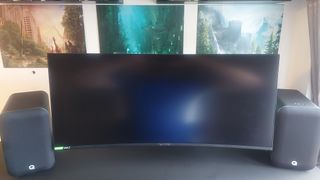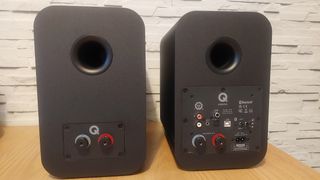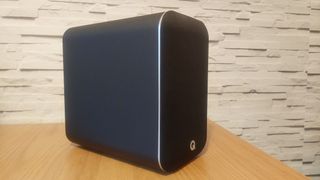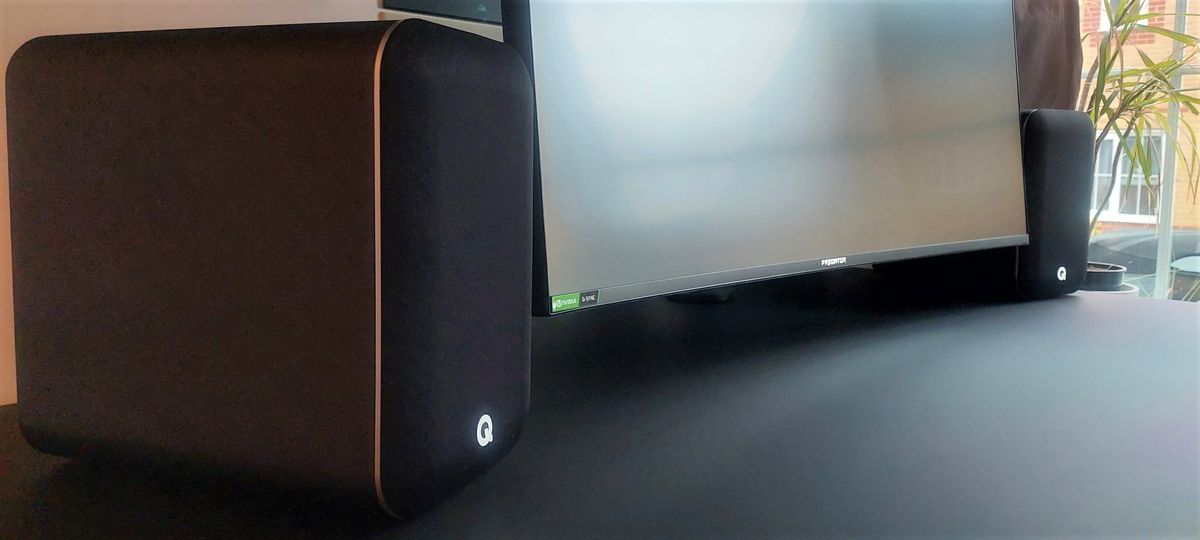12DOVE Verdict
The Q Acoustics M20 HD speakers are a complete audio solution in the form of two bookshelf speakers. The audio is simply fantastic, the connectivity is terrific, and the versatility, performance, and power that the M20 HDs offer is basically unparalleled.
Pros
- +
Incredible audio across all media
- +
Impressively powerful
- +
Great connectivity
- +
Versatile
Cons
- -
Simple controls and remote
- -
No virtual surround modes - it's just stereo
Why you can trust 12DOVE
The Q Acoustic M20 HDs could be the audiophile-level speaker system gamers have been looking for all along. These two bookshelf speakers with built-in amp and controls have been with me for a number of weeks now, and have seriously impressed me across both PC and TV setups.
But can they be some of the best computer speakers and be one of best gaming sound systems? Are they able to take on dedicated and arguably simpler soundbars, or offer the same level of audio range as a quality set of 2.1 speakers with a dedicated woofer? Let me tell you that, yes, yes they can. Let me explain why.
Design & Features
The Q Acoustics M20 HD speakers very much retain that Q Acoustics aesthetics that fans or folks familiar with the brand will recognise. Each speaker is a chunky, tall cuboid that, in reality, does take up quite a bit of space.
As you can see from the image below, they do take up a large amount of room wherever you put them, and this was immediately noticeable when I was rebuilding my setup after adding some shelves a short while ago (hence the empty desk).
However, as speakers for a TV setup, they are less intrusive as the more open space you have can swallow them up. I've tested these on the floor, and they do perform well, but their design means they are best served on the official stands which can raise them more than 2 feet (or more than 600mm), or in bookshelves - though you will need deep shelves to cater for the speakers and connections.
Those connections are integrated into the active, powered speaker and offer more than you could throw a stick at, with the only exception of HDMI ARC. This might be irksome for some folks, but the alternatives provide more than enough options and offer great flexibility.
And while they claim to be wireless, the M20 HDs are not truly wireless as you'll still need to connect the speakers to each other and to a power source - only here could you then go wireless by connecting to an audio source over Bluetooth. However, one more cable here to properly attach to your source in order to get the best audio is not too much of a compromise (especially in a TV setup; it might be harder to conceal on a desk).

Getting the amp and all the controls built into a single speaker so you don't have to faff about with an extra amp unit is a joy, and the added simplicity is most welcome - especially when the audio payout is what it is.
The controls and buttons are of a very streamlined and simple design: on top of the powered speaker, you have the power button with an LED around it, and a volume up button and down button. That's it. The remote is quite restrained too. After all, there are no EQ options or any other features to cycle between here.
However, the display is so stripped back almost to the point of them being a bit of a challenge. The LED around the power button changes colour to indicate the source - so if you've got these on the 3000i stands (which do make them look very handsome) or placed away from you, then it might well be hard to see it while changing source or volume level. There's no display or volume level indicator in the form of numbers, for example, and that would be perfect.
Speakers: 1 x 0.87" (22mm) Tweeter; 1 x 4.92" (125mm) Mid Bass / Driver
Dimensions (HxWxD): 10.98 x 6.69 x 11.65" (279 x 170 x 296mm)
Weight: Powered speaker: 12.1lb (5.5kg); Passive speaker: 11.25lb (5.1kg)
Connectivity: In: 3.5mm audio, Stereo RCA, Optical, USB, Bluetooth 5.0; Out: Subwoofer
Price: $699 / £439
Tested with a Samsung QLED TV, and on PC.
However, offsetting this slight downside a little is the fact that there are also very clever additional controls on the powered speaker. There is a switch to change the bass level, dependent on how close you have positioned the speakers to the walls - handily and clearly described in the setup guide - and also a switch to change the powered speaker to be either the Left or Right channel. This means the M20s offer you further flexibility, but giving you the power to place them where you want and ensure the audio is not compromised.

Overall, however, the design and features and connectivity make setting up the M20 HDs a cinch, and very easy. I reviewed the Q Acoustic 3010i 5.1 system a few years back and, while the audio was excellent, the setup, cable management and extra gear needed (like an amp) didn't make it an attractive solution to a typical console-and-TV gaming setup. Now, some folks won't mind that and always want to shoot for a proper surround sound system. But for me, the M20 HDs are immediately more attractive - the cleaner, simpler setup is appealing, and the design is excellent.
Performance

The proof's in the audio pudding though, and the M20s deliver. These are the most powerful set of two speakers I've ever used and they can really shake your walls - but they will also give you incredibly well-balanced audio. Accurate and precise audio. Rich and detailed audio. Bombastic and wide-reaching audio. The whole audio range across all media is brilliant. Bouncing between ASTRO's Playroom and Middle Earth: Shadow of War on my PS5 has been great with the details of ASTRO's funhouse and the landscape of Mordor both given to me beautifully and with great texture and detail. On PC, Dawn of War III has never been crisper in its chaotic battles, and Red Dead 2's landscape has never felt more alive.
Yes, there isn't any virtual surround sound or fancy feature like that - it's just stereo here - and you may still be better off using one of the best gaming headsets for competitive play, but the sound quality is so good that whatever game I was playing was a sheer joy.
The bass level is great too by default, but if you ever need more, then the ability to team the M20s with a dedicated woofer like the Q Acoustics 3060S just by using an analogue subwoofer cable down the line is an extra string to the M20s bow.

In terms of usage and interaction, the speakers should be a set-up-and-done kind of affair. Especially when positioned in a TV setup, you can't really go wrong. However, on a desk, it may be a little more tricky. You'll need lots of desk space and it'll also add another 10kg of weight. Again, though, the payout is worth it, and their size is part of why they are so good.
And while the setup is purely left and right, a niche benefit of the M20 HDs is that they are a perfect consideration to team with those new gaming TVs that have 'low setup' or little-to-no stand height. Something like the Sony A95K sits very flush to any surface it is placed on, for example, and doesn't allow room for a soundbar without impacting visibility - the M20s would provide a great solution to this.
Should you buy the Q Acoustics M20 HD speakers?

The M20s absolutely earn their five-stars from us. They are a terrific audio solution for gaming and can be deployed brilliantly for console-and-TV gaming or as part of a desktop gaming setup.
The audio provided is incredible, very powerful, rich, detailed, and just wonderful to soak up. Their execution and ability are also so good that you won't know you haven't got a central speaker if they are on either side of a screen - no virtual surround sound, yes, but the audio is that good nonetheless. They are also super versatile with basically all the connections you could ever want or need, and the fact that no extra amp is necessary at all, and the amp-speaker can be designated left or right at the flick of a switch only enhances that. Further still, the options on bass performance depending on location, and the option to add a stand-alone woofer later (and stands) are superb options.
With a list price of $699 / £439 and often selling for less than that, they offer decent value too. While other sets of gaming computer speakers will be cheaper, remember you are getting audiophile-grade sound here, and some extremely smart engineering all inside two bookshelf speakers. And in that context of high-end audiophile speakers, they are incredibly attractively priced. The M20 HDs also genuinely show that you might not need a surround sound system for gaming to get the best audio, and at their price, they also blow a lot of more-expensive competition, like the Razer Nommo Pros, out of the water.
They are such a high-quality audio offering that I simply cannot recommend these speakers more, and someone will have to prise them from my cold dead hands if they are to be moved out of my setup now - they really are that good.
How we tested the Q Acoustics M20 HD speakers
As always with such hardware, the M20 HDs become my everyday speakers - both in my PC play-and-work setup, as well as my TV setup.
After first testing on PC with the speakers on either side of my ultrawide and providing excellent audio for games like Red Dead 2, Dawn of War II, and Apex Legends, I plugged them into my living room TV for everyday TV show-watching, Netflix-binging, and console-gaming. They shone in both spheres, and playing Middle Earth: Shadow of War while being blasted by the M20 HDs was a particular joy - orc barks had never been clearer. Away from games, the M20s were used as normally as you might every day too - for watching sports like football (soccer) and Formula 1, as well as diving into House of the Dragon and The Rings of Power too.
You can read more about our hardware approach to all the gear we get our hands on in our full 12DOVE Hardware Policy.
Tested with a Samsung QLED TV, and on PC with a Razer Blade 15 laptop supplied by Razer and with an Acer Predator X38 monitor from Acer.
If you're looking to up your display game as well as your audio game, then check out our best gaming monitor, best ultrawide monitor, and best curved gaming monitor guides.
Rob is the Deputy Editor of sister site, TechRadar Gaming, and has been in the games and tech industry for years. Prior to a recent stint as Gaming Editor at WePC, Rob was the Commissioning Editor for Hardware at 12DOVE, and was on the hardware team for more than four years, since its inception in late 2018. He is also a writer on games and has had work published over the last six years or so at the likes of Eurogamer, RPS, PCGN, and more. He is also a qualified landscape and garden designer, so does that in his spare time, while he is also an expert on the virtual landscapes and environments of games and loves to write about them too, including in an upcoming book on the topic!

Inzoi dev says "highly inappropriate" bug that let you kill kids with your car has been patched out: "We are strengthening our internal review processes"

"30 years of history reside in our tape backups": PlayStation's building a game preservation mineshaft vault with 200 million files going back to a 1994 build of PS1 JRPG Arc the Lad

The other big Soulslike out this week has some Bloodborne and Dark Souls 3 in its combat, dev says, but "we would rather call AI Limit an action RPG"












